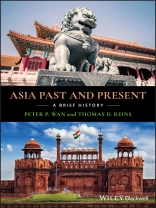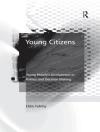A wide-ranging introduction to the multi-faceted history of Asia–from early origins to the present
Asia Past and Present is an expansive survey of the social, political, and economic history of the continent from the Paleolithic era to the early 21st century. As there is no physically discrete continent, rather an arbitrary division of the Eurasian landmass, this book focuses on terrain that encompasses India, Pakistan, Afghanistan, Central Asia, China, Korea, Japan, Mongolia, the Russian Far East, and Southeast Asia–the area which most modern scholars identify as Asia.
Offering broad chronological and topical coverage of Asia, this book examines subjects including written languages, religions and philosophies, concepts of monarchy, militarism, independence and nation building, and more. Particular focus is placed on the varying levels of influence the core cultures of India and China have had on the continent in a multitude of socio-political areas. Historical dialogues of how colonies, later emerging nations, blended traditional Asian culture and Western political and economic models of modernization complement contemporary discussions of globalization, nuclear tensions, and growing demands for greater individual freedom. Written in an engaging, accessible style, this book:
* Covers of a wide range of topics, perspectives, geographic regions, and time periods
* Highlights India and China as the pre 19th century cultural cores of Asia
* Presents a relatable political-cultural narrative framework
* Discusses contemporary themes including gender, sexual orientation, the environment, and Western and Islamic influence on Asian culture
* Includes coverage of commonly underrepresented regions such as the Himalayan nations, Maldives, and New Guinea
Asia Past and Present: A Brief History is a valuable resource for undergraduate courses where Asian cultures are introduced, and in courses on Asian politics, diplomacy, environmental issues, and socio-economics.
Table of Content
About the Authors ix
Acknowledgments xi
Introduction 1
Part 1 Asian and Non-Asian Cultures Interact to circa 1850 CE 7
Introduction to Part 1: Asian and Non-Asian Cultures Interact to circa 1850 CE 9
1 Cultures and the Development of Core Asian Civilizations 13
2 The Land and the People of Ancient China to 221 BCE: Xia, Shang, and Zhou Dynasties 25
3 China’s First Empire: The Qin and Han Dynasties, 221 BCE-220 CE 37
4 The Golden Age of Imperial China: The Sui and Tang Dynasties, 581-960 49
5 The Peaking of Traditional Chinese Civilization: The Song and Yuan Dynasties, 960-1368 59
6 The Decline of Imperial China: The Ming and Early Qing Dynasties, 1368-1840 73
7 Premodern Japan and Korea 87
8 The Formation of Indian Civilization: 1200 BCE-185 BCE 103
9 The Hindu Synthesis at Home: 185 BCE-1200 CE 117
10 The Indianization of South, Central, Southeast, and East Asia: 185 BCE-1200 CE 131
11 India under Islamic Rule: The Delhi Sultanate and Mughal Empire, 1206-1707 143
12 On the Indian and Chinese Northern Frontiers: Asian Empires and Kingdoms on the Central and Inner Asian Steppe, circa 1100-1850 157
13 On the Indian and Chinese Southern Frontiers: Asian Empires and Kingdoms in Southeast Asia, circa 1100-1850 171
14 European Empires in Asia: The Foundations for Revolutionary Transformation, circa 1500-1850 185
Part 2 The Age of Transformations: Nationalism and Modernization in the Era of Global Wars and the Search for New Social Arrangements, circa 1800 to Present 197
Introduction to Part 2: The Age of Transformations: Nationalism and Modernization in the Era of Global Wars and the Search for New Social Arrangements, circa 1800 to Present 199
15 Foreign Incursions, Domestic Challenges, and Late Qing Dynastic Decline: China’s Long Road to Modernization, 1840-1911 203
16 The Birth of Republicanism in China, 1911-1949 221
17 The People’s Republic of China, 1949- 235
18 Japan’s Rapid Modernization, 1868-1918 253
19 Japan Goes from Liberalism to Militarism, 1918-1945 265
20 Japan since World War II 279
21 Korea in Modern Times 293
22 The European Struggle for India and the Emergence of Indian Resistance, 1707-1914 311
23 The Impact of World Wars, Revolution, and Nationalism in India and South Asia, 1914-1945 325
24 India since 1945 341
25 In India’s Orbit: South Asian Nations in the Cold War Setting and the Rise of China 357
26 Mainland Southeast Asia since 1945 381
27 Insular Southeast Asia since 1945 413
28 Colonialism, Independence, and Nation Building on the Northern Frontiers of India and China, 1850-2019: Afghanistan, Central and Inner Asia, and the Russian Far East 443
29 Asia in the Twenty-First Century: The Problems of Progress 465
Index 479
About the author
PETER P. WAN, PHD, was Full Professor of American Language and Literature at East China Normal University, Shanghai, and visiting scholar at Harvard University. Now retired, he is a three-time recipient of the Fulbright Fellowship and author of World History: A Concise Thematic Arrangement.
THOMAS D. REINS, PHD, is a Lecturer in the Department of History at Chapman University, California, USA. He has written numerous articles, book chapters, encyclopedia entries, and reviews in publications including Modern Asia Studies, China Review International and Journal of Asian Studies. He is currently working on a book dealing with the consequences of the modernization of Asia, Transforming Asia.












